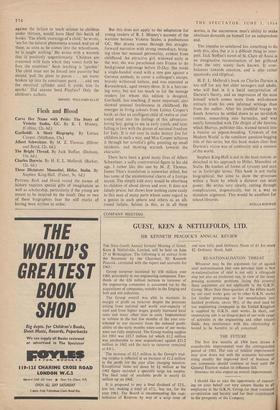Flesh and Blood
Carve Her Name with Pride: The Story of Violette Szabo, GC. By R. J. Minney. (Collins, 12s. 6d.) PurriNG flesh and blood round the names of history requires special gifts of imagination as well as scholarship, particularly if the young are meant to be inspired by the result. One or two of these biographies bear the stiff marks of having been written to order. But this does not apply to the adaptation for young readers of R. J. Minney's account of the wartime heroine Violette Szabo, a posthumous GC. Her drama comes through this straight- forward narrative with strong immediacy, bring- ing close her unusual personality, evident from childhood. An attractive girl, widowed early in the war, she was parachuted into France to do background espionage before D-Day. She made a single-handed stand with a sten gun against a German ambush, to cover a colleague's escape, bravely withstood torture, and was executed at Ravensbruck, aged twenty-three. It is a harrow- ing story, but not too much so for the teenage readers for whom this edition is desigtied. Garibaldi, less touching, if more important, also showed unusual fearlessness in childhood. He emerges in living colours from Lettice Cooper's book, so that an intelligent child of twelve or over could enter into the feelings of this adventure- loving boy, going to sea in early youth, and later falling in love with the dream of national freedom for Italy. It is not easy to make history live for children in such a way, and Miss Cooper achieves it through her novelist's gifts, pointing up small incidents, and showing warmth towards the character.
There have been a good many lives of Albert Schweitzer, a sadly controversial figure in his old age. I rather like this one by M. Z. Thomas. James Thin's translation is somewhat stilted, but has some of the unintentional charm of a foreign accent. The simply told story would be absorbing to children of about eleven and over. It does not falsely praise, but shows how nothing came easily to this man of many parts whom some regard as a genius in each sphere and others as an all round failure. Salient in this, as in all these stories, is the uncommon man's ability to make obstinate demands on himself for an independent end.
The impulse to sainthood has something to do with this, also, but it is a difficult thing to inter- pret. Jack Steffan's novel of St. Clare of Assisi is an imaginative reconstruction of her girlhood : from the very scanty facts known. It over- balances towards emotion, and is also rather spasmodic and elliptical.
H. E. L. Mellersh's book on Charles Darwin is too stiff for any but older teenagers and adults, who will find in it a lucid interpretation of Darwin's 'theory, and an impression of the man himself' which comes more from well-chosen extracts from his own informal writings than from the author. After his youthful voyage to South America he settled down to an invalidish routine, researching into barnacles, and was nearly forestalled with The. Origin of the Species, which Murray, publisher-like, wanted turned into ;I a treatise on pigeon-breeding. 'Creators of the Modern World' is the somehow question-begging title of this series, but this book makes clear that Darwin's vision was of continuity and a oneness of the world.
Stephen King-Hall is not in the least remote or detached in his approach to Hitler, Mussolini or Stalin. He loathes all forms of tyranny and says so in forthright terms. This book is not really biographical, but aims to show the processes within a State by which a dictator can seize power. He writes very clearly, cutting through complications, dogmatically, but in a way to stimulate argument. This would be excellent for school libraries.
STELLA RODWAY






































 Previous page
Previous page